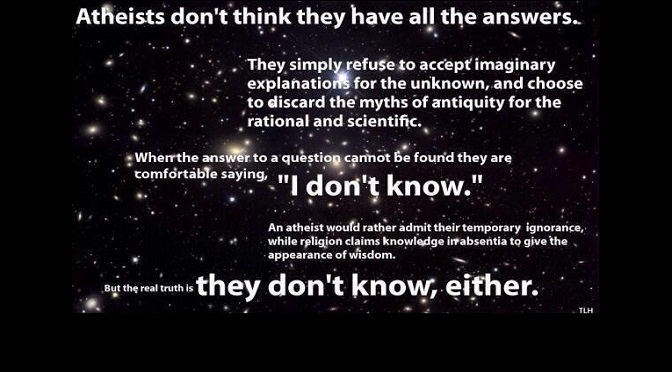It’s really a cultural thing. Someone asks you something and instead of saying “I don’t know”, you make up something. You don’t want to appear dumb.
But several things happen when you do this.
1) It’s not honest, and if you’re found out, you not only appear dumb, but dishonest as well.
2) The answer that you give may make you seem even dumber than if you said “I don’t know”.
3) If you do pull it off, you’re spreading misinformation.
4) You miss an opportunity for learning. You might actually find out the answer if you confess that you don’t know.
Our society, as indeed has most of the western world, has moved into the mind-set that admitting to ignorance is not-cool where cool is everything. It seems that the last person to have actually admitted to being ignorant might have been Socrates who said “I know nothing except the fact of my ignorance”. At least it seems that way sometimes.
When we feign knowledge it hurts us individually, and as a society. Annaka Harris in I Wonder writes:
“We live in a society where people are uncomfortable with not knowing. Children aren’t taught to say “I don’t know,” and honesty in this form is rarely modeled for them. They too often see adults avoiding questions and fabricating answers, out of either embarrassment or fear, and this comes at a price. To solve the world’s most challenging problems, we need innovative minds that are inspired in the presence of uncertainty. Let’s support parents and educators who are raising the next generation of creative thinkers.
Nowhere is this more rampant than in religion.
Just go up to any religious leader and ask them something about heaven. Say “Can I still watch TV in heaven?” If the preacher/imam/priest were being honest, they’d say “I don’t know the bible doesn’t address that.” However, if I guess correctly, they’ll say “Yes! God would not deny something that gives people so much pleasure.” You can be sure that he’s making it up, no matter what he says about it because the Bible says almost nothing about heaven. Then you have to ask yourself, how about all the other “knowledge” that he shares with you.
Has he told you what he learned in seminary, or is he just passing on what you want to hear? Has he told you how the Bible was actually put together by committee? And translated by committee? Did he mention that there are many, many books that didn’t make it into the bible? Has he ever mentioned that nobody actually knows who wrote any of the books in the Bible, not even the Gospels? Has he said anything about the many things in the bible that biblical scholars are unsure about? Or is he relying on his own version of “feelings”? And trusting that your “feelings” will let him get by with it?
In Religion, the name of this pretension is Faith. Peter Boghossian, Silver professor of philosophy at New York University, defines faith as “Pretending to know things that you don’t know.”, and to me that just about sums it up. Believers have Faith that prayer works; Faith that Jesus is coming back next week; and Faith that God is watching you. They have Faith that god protected them in that car accident last week. (Never mind that 3 other Christians died in it.) They have Faith that god is real and the bible is His word.
You don’t know that. Having a “feeling in your heart” is not a path to knowledge. Think about all the other religions whose members say that the feeling in their heart represents God’s truth. Think about the 9/11 Muslims who KNEW with great certainty that they were doing what god wanted them to do. Think of the Mormons who felt in their hearts that Joseph Smith was the last prophet of God, and that his books contain God’s Truth. Think of the members of the Heaven’s Gate cult who knew in their hearts that there was a UFO trailing comet Hale-Bopp, and felt it with such certainty that they were willing to commit suicide for it. Think of the members of the Jonestown cult who felt their “Truth” so strongly that they not only were willing to commit suicide, but to poison their own children as well.
You don’t think twice about saying “Yes, they were wrong, but I can feel my truth. It can’t be the same.” Can’t it? If, in fact, they did know, then your feelings are wrong, along with all the other religious feelings of all the other religions in the world. But feelings don’t equal fact.
The only difference between cults and religion is the number of members; larger numbers lead to general societal acceptance. The major religions of the world all started off as cults and were then spread by family descendants, word of mouth and force. The biggest of these were often spread at the point of a sword by warlords and generals.
Daniel Patrick Moynihan once said “You are entitled to your own opinion, but you are not entitled to your own facts”. If you don’t know something to be true, then say so. You might actually learn something during the conversation.

